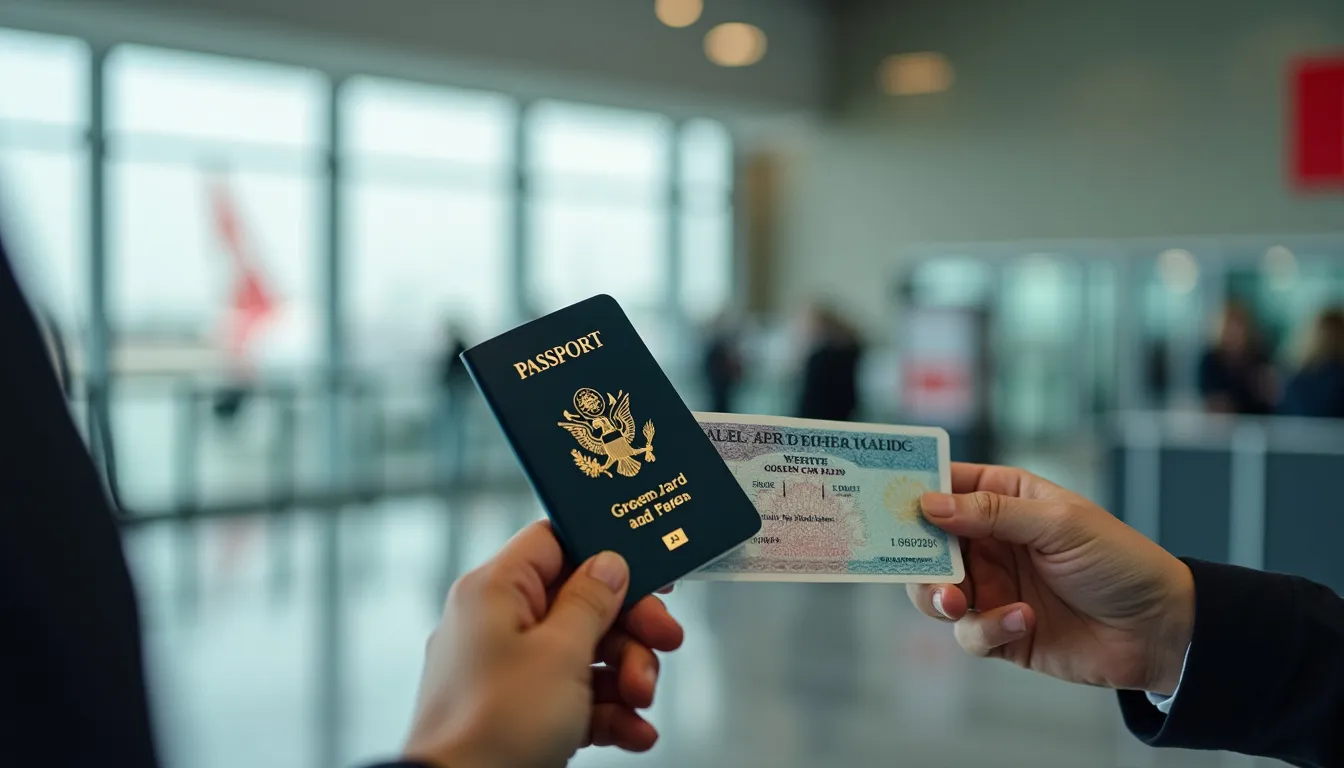Traveling to Canada with a Green Card is an exciting prospect for many U.S. permanent residents seeking to explore the wonders of the Great White North. Whether you’re drawn by the bustling city life of Toronto, the stunning landscapes of Banff National Park, or the rich cultural heritage of Quebec, understanding the regulations and requirements for Green Card holders is essential to ensure a smooth and hassle-free journey. A Green Card not only allows you to live and work in the United States but also provides certain privileges when traveling internationally. One of the most commonly asked questions is, Can I travel to Canada with a Green Card? The simple answer is yes, but it comes with detailed guidelines and documentation protocols that need to be followed.
As a Green Card holder, it’s crucial to comprehend the entry requirements set by Canadian authorities, including whether you need a visa, the essential documents you must carry, such as a passport and your Green Card, and the process you will encounter at the border. Additionally, ensuring that your travel documents are valid, understanding the re-entry requirements into the U.S., and considering other essential factors like health insurance and local laws in Canada are key to a seamless travel experience. This guide aims to equip you with all the necessary information to make your trip as straightforward as possible, covering everything from visa requirements to practical travel tips. So, if you’re planning a trip and are asking yourself, Can I travel to Canada with a Green Card? read on to find out everything you need to know before you embark on your adventure.
Understanding the Basics: Traveling to Canada with a Green Card
Introduction to Green Card Holders Traveling Abroad
For Green Card holders, traveling abroad can open up a world of opportunities for both business and leisure. However, each destination has its unique entry requirements, and it’s vital to be well-informed before you embark on your journey. Canada, with its picturesque landscapes and vibrant cities, is a popular destination for many U.S. residents. But one of the main questions that arise is, Can I travel Canada with Green Card?
What is a Green Card and What Rights Does It Confer?
A Green Card, officially known as a Permanent Resident Card, grants the holder the right to live and work permanently in the United States. As a Green Card holder, you enjoy certain protections and benefits, including the ability to travel outside the U.S. and return, provided you adhere to specific re-entry requirements. However, a Green Card does not equate to U.S. citizenship, which means international travel involves different considerations and compliance with each country’s entry rules.
Addressing the Common Query: Can I Travel Canada with Green Card?
CAN I TRAVEL CANADA WITH GREEN CARD? Absolutely, but with some conditions. Green Card holders do not need a visa for short trips to Canada, making it relatively straightforward to visit this neighboring country. However, they’re required to carry their Green Card and a valid passport from their country of citizenship. Due diligence in confirming these documents are up-to-date is crucial to ensure a smooth entry and exit process.

Entry Requirements for Green Card Holders Traveling to Canada
Visa Requirements: Do Green Card Holders Need a Visa to Enter Canada?
Many Green Card holders often wonder, Can I travel to Canada with a Green Card without a visa? The answer depends on several factors. Generally, U.S. Green Card holders do not need a visa to enter Canada for short visits, such as tourism or business trips lasting up to 180 days. However, you will still need to fulfill certain entry requirements to ensure a smooth trip.
It is essential to verify the specific visa requirements for your particular situation. While a visa is typically not needed, some travelers may require an Electronic Travel Authorization (eTA). The eTA is a document linked electronically to your passport, used to screen travelers before boarding flights to Canada. It’s always best to check the latest updates on the Canadian government’s official website or consult with relevant authorities to ensure you have the necessary documentation.
Necessary Documentation: Passport, Green Card, and Additional Papers
When traveling from the United States to Canada with a Green Card, specific documentation is required to gain entry. The essential documents you need include:
- Passport: A valid passport from your country of citizenship is required. Ensure that your passport does not expire while you are in Canada. It’s advisable to have a passport with at least six months’ validity before your travel date.
- Green Card (Permanent Resident Card): Your Green Card must be valid and unexpired. This card serves as proof of your permanent resident status in the United States and can be requested by border officials.
- Electronic Travel Authorization (eTA): As mentioned earlier, depending on your nationality, you may need to obtain an eTA. This is easily done online and often processed within minutes. Be sure to apply for your eTA well before your travel date.
Additionally, it’s beneficial to carry any other identification documents or papers that may be requested by Canadian border officials. These could include a travel itinerary, hotel booking confirmations, and any letters of invitation if you are visiting friends or family.
Border Control Process: What to Expect When Arriving in Canada
Upon arrival in Canada, Green Card holders will need to go through Canadian Customs and Border Protection. Here’s what you can expect during the border control process:
- Arrival and Inspection: Once you disembark from your flight or cross the land border, you will be directed to the customs and immigration area. Here, you will present your passport and Green Card, and potentially your eTA, to a border services officer.
- Interview with a Border Services Officer: The officer will ask a few questions to understand the nature and purpose of your visit, the duration of your stay, and if you have sufficient funds to support yourself during the trip. Be honest and concise in your responses.
- Documentation Review: Your documents will be reviewed. Make sure you have your passport, Green Card, and any other required documentation readily accessible. Any discrepancy in documents can lead to delays or even refusal of entry.
- Customs Declaration: After the immigration check, you will go through customs. You may need to declare any goods you are bringing into Canada. Ensure you are aware of Canadian customs regulations to avoid any issues.
- Secondary Inspection (if required): In some cases, you may be directed to secondary inspection for further questioning or document verification. This is a standard procedure and does not necessarily indicate a problem with your entry.
Having all the necessary documents in order and being prepared for the process can make your entry into Canada as a Green Card holder much smoother. Remember to check the latest travel advisories and border control guidelines before your trip, as regulations can change.
Traveling to Canada with a Green Card can be a hassle-free experience if you adhere to these entry requirements and prepare accordingly. By understanding visa needs, gathering necessary documents, and familiarizing yourself with the border control process, you can ensure a pleasant journey.

Tips and Precautions for a Smooth Trip
Ensuring Validity: Checking Expiry Dates on Passports and Green Cards
As a Green Card holder, one of the most critical steps before embarking on your trip to Canada is ensuring the validity of your essential travel documents. Primarily, you should check the expiry dates on both your passport and green card. An expired passport or green card can lead to unnecessary delays and complications.
Ensure your passport remains valid for at least six months beyond your intended stay in Canada. While the Canadian government does not have a strict six-month rule for tourists, having ample validity on your passport can facilitate smoother entry and exit processes. Similarly, your Green Card should be up-to-date and not nearing expiry. If either document is close to expiration, consider renewing it before your trip to avoid any travel disruptions.
Traveling Back to the U.S.: Re-Entry Requirements for Green Card Holders
Although leaving the U.S. for a short trip to Canada might seem simple, re-entering can involve specific requirements and precautions. Green Card holders must present their valid green card upon re-entry into the U.S. Additionally, having a valid passport is crucial, as it serves as proof of identity and nationality.
It’s also important to be aware of the duration of your stay outside the U.S. Extended stays abroad can raise red flags with U.S. Customs and Border Protection (CBP) officials, potentially jeopardizing your Permanent Resident status. In general, trips lasting more than six months but less than one year may prompt questions about your intent to maintain permanent residence in the U.S. Trips exceeding one year without obtaining a re-entry permit can result in more severe complications, including the possible loss of your Green Card.
A re-entry permit can be used if you plan to be out of the U.S. for an extended period. This document essentially informs the CBP of your intention to return and maintain your U.S. residency. Applying for a re-entry permit should be done well in advance of your travel plans to ensure you receive it on time.
Additional Considerations: Health Insurance, Currency, and Local Laws in Canada
When traveling to Canada, numerous additional considerations can enhance the quality and safety of your trip. Health insurance is a crucial factor. Although Canada boasts a renowned healthcare system, it does not extend its benefits to tourists. Therefore, obtaining travel health insurance that covers injury, illness, and emergency medical evacuation is highly advisable.
Understanding the currency exchange is another vital aspect. The Canadian Dollar (CAD) is the official currency of Canada. Familiarize yourself with the current exchange rate between the Canadian Dollar and your home currency. Having some Canadian currency on hand for small purchases or in cash-only establishments can be very convenient. Additionally, many businesses in Canada accept major credit and debit cards, but notifying your bank of your travel plans can prevent any unexpected card denials.
Acquiring knowledge about local laws and customs in Canada can ensure that your trip is free from legal hassles. Canada has its own set of regulations regarding substances like alcohol and cannabis, varying by province. Following these laws can avoid potential legal issues. For instance, Canada legalized recreational cannabis in 2018, but there are strict regulations on its possession, purchase, and consumption. Familiarizing yourself with such local laws is crucial for a hassle-free experience.
Moreover, being respectful of Canadian customs and culture can make your visit more pleasant. Canadians are known for their politeness and social etiquette, such as tipping service workers and adhering to queue customs. Respecting these social norms can enhance your interaction with locals and make your travel experience more enjoyable.
By staying proactive and informed about these various aspects, your trip to Canada will likely be smoother and more enjoyable. Ensuring the validity of your travel documents, understanding re-entry requirements, and considering additional factors like health insurance, currency exchange, and local laws are all essential components of a successful journey.
We hope this segment has answered the common query can I travel Canada with green card and provided you with the practical tips for a seamless travel experience. As you plan your adventure to the Great White North, taking these precautions into account will undoubtedly contribute to a memorable and trouble-free visit.
Traveling to Canada with a Green Card opens up exciting possibilities for Green Card holders eager to explore the vibrant culture and scenic beauty of Canada. As outlined, it’s crucial to understand the basics, starting with what a Green Card is and the rights it confers, including the ability to travel internationally. One of the most common queries is whether a Green Card allows one to enter Canada without a visa. Generally, Green Card holders do not need a visa to visit Canada, but they must ensure they have the necessary documentation, such as a valid passport, their Green Card, and any additional papers that may be required by Canadian authorities.
When arriving in Canada, travelers can expect a standard border control process where they will be asked to present their documents and might undergo routine questioning. To ensure a hassle-free trip, it’s important to check that both the Green Card and passport are valid and up-to-date. Additionally, returning to the U.S. after the trip requires re-entry compliance, which means having all documentation in order to avoid any issues at the U.S. border.
Moreover, travelers should also consider other factors such as health insurance to cover potential medical needs while in Canada, being aware of the local currency, and understanding Canadian laws to ensure a smooth and enjoyable visit. By preparing adequately and following these guidelines, Green Card holders can experience a seamless travel experience to Canada, making the most of their journey across the northern border.







